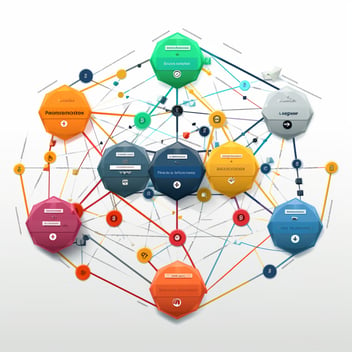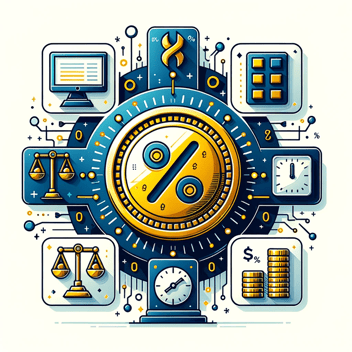The Impact of Blockchain Technology on Existing Industries
As a disruptive technology, blockchain is casting ripples across an array of sectors:

Financial Services:
Blockchain's inception came with bitcoin, a cryptocurrency aiming to decentralise financial systems. Its underlying technology, blockchain, is now redefining traditional financial paradigms by enabling seamless, trustless transactions, thereby reducing fraud, lowering costs and expediting processes.
Supply Chain Management:
Supply chains are pivotal in the seamless operation of numerous industries. Blockchain bolsters supply chain management by offering real-time, immutable tracking of products from manufacturer to consumer, significantly enhancing accountability and reducing inefficiencies.
Healthcare:
Blockchain can safeguard sensitive patient data, ensuring it remains unaltered and accessible only to authorised individuals. Additionally, it can streamline the sharing of healthcare records among different institutions and individuals, ensuring accuracy and privacy.
Real Estate:
The real estate sector grapples with fraudulent land grabs and cumbersome title transfers. Blockchain can demystify property ownership by providing a transparent, unchangeable ledger where property records are stored securely.
Intellectual Property & Royalties:
Blockchain facilitates transparent and unchangeable ledgers, providing a robust platform for artists and creators to claim ownership over their intellectual properties and automate royalty payments, reducing disputes and ensuring fair compensation.
Voting Systems:
Blockchain could redefine voting systems by ensuring a transparent yet anonymous environment, making elections more fair, accessible and free from manipulation.
Energy Sector:
Through blockchain, energy systems can evolve into decentralised grids, allowing consumers to buy and sell excess energy among themselves without intermediaries.
Education:
Verification of academic credentials can be streamlined through blockchain, reducing fraud and ensuring integrity in the education sector.
Digital Identity:
In an era where identity theft and data breaches are rampant, blockchain offers a shield of security. By providing individuals control over their digital identity, blockchain promotes a paradigm where identity information is self-sovereign, minimising risks associated with centralised data storage.
Insurance:
Blockchain's immutability and transparency are cornerstones for revamping the insurance sector. By streamlining claims processing through smart contracts and providing an unalterable ledger for policy and claims data, blockchain minimises fraud and expedites service delivery.
Media and Entertainment:
In media and entertainment, blockchain could usher in a new era of fair compensation and content authenticity. By enforcing royalty agreements through smart contracts and providing a transparent record of content ownership, blockchain combats piracy and ensures creators are fairly remunerated for their efforts.
Sports and Esports:
Blockchain emerges as a game-changer in the sports and esports domains. From transparent athlete contracts to fan engagement via tokenisation and the authentication of memorabilia, blockchain's versatile applications are reshaping these sectors for a more interactive and fair ecosystem.


